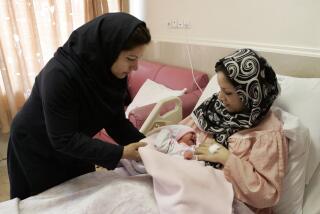Romania Abortions Soar Since the Revolution : Health: Ceausescu had banned the procedure to boost the birth rate. Today, abortion costs as little as $2--but contraceptives are unavailable or expensive.
- Share via
BUCHAREST, Romania — Nearly 500,000 women have had an abortion since the overthrow of dictator Nicolae Ceausescu, who had banned the procedure.
Health authorities are offering contraceptives and sex education, but they are stymied by an ignorance of contraception and an indifferent attitude toward abortion, which costs less than $2 in some places.
Under Ceausescu, who was obsessed with increasing Romania’s population of 23 million, contraception was unknown and abortion, with few exceptions, was prohibited. Women were obliged to undergo periodic examinations to ensure they were not hiding a pregnancy.
They resorted to illegal, back-shop abortions, many performed in primitive conditions. Some died, and tens of thousands of unwanted children still languish in ill-equipped orphanages.
Doctors and patients caught by police were subject to prison terms, and restrictive laws made couples distrustful of contraceptives.
That attitude has outlived Ceausescu, who was executed with his wife, Elena, on Dec. 25 and replaced by a more moderate leadership.
“Of course, I would rather have an abortion than use condoms,” declared one woman in a recent interview with state television. Most of the other women on the program agreed.
Sorin Puia, founder of the new volunteer Society for Sexual Education, said many women come to abortion clinics too late.
“Many women continue to resort to self-inflicted abortions,” he said. “Hundreds have been mutilated.”
Romania produces only a small percentage of the condoms and other contraceptives it needs, and foreign-made contraceptives are expensive on the black market, often out of reach of most Romanians’ budgets.
On the other hand, abortions are inexpensive and available on demand.
“The former government did not want anyone to know anything about sex education,” said Emil Tomescu, deputy minister of health.
The ministry has responded by initiating a family-planning program, including instruction on how to get and use condoms.
The program, which includes both direct instruction and television and radio ads, is administered by educators and gynecologists offering free advice on methods from the pill to the IUD.
“It involves more than just sex life; it also means making financial and other decisions . . . and we hope we can improve health standards in this country,” Tomescu said. “We do not expect spectacular, immediate success.”
As the official program struggles to get off the ground, the number of abortions continues to soar. According to a recent report in the mass-circulation daily Adevarul, more than 1 million abortions have been performed since January.
Serban Nicolescu, the Health Ministry’s inspector-general, said the actual figure is lower. He estimates 440,000 women, or one in 10 of child-bearing age, have aborted pregnancies in that time.
The population-growth project and Ceausescu’s other schemes, such as the eradication of the country’s peasant villages, ended with his ouster.
But the effects of his disastrous social and economic policies are still evident everywhere, including the poor quality and chronic undersupply of locally made condoms and the severe shortage of powdered milk for babies.
General lack of knowledge about sex has also led to an increase in acquired immune deficiency syndrome. Ceausescu banned discussing the consequences of the disease by simply claiming it did not exist in Romania, doctors said.
It will take some time before the total number of AIDS cases due to unsafe sex will become known, said the ministry’s anti-AIDS coordinator, Florin Popovici. Since January, about 60 new adult cases have been discovered.
Most of the other roughly 800 AIDS patients in Romania are children who contracted the killer disease primarily through blood transfusions.
In June, the government contracted with a local company to produce 30 million condoms. But this supply, even when it hits the market, is estimated by family-planning officials to last no more than several months in a country of Romania’s population.
Local condoms cost about 5 cents and donated condoms, as well as diaphragms, have only recently been made available through hospitals and clinics. Few people, however, know about donated contraceptives, and the process of getting them can be complicated.
Puia decried the continuing “lack of sanitary and sexual education among youth, students and workers.”
“They aren’t informed,” he said. “The clinics are assaulted daily by dozens of women” who come for abortions, many too late in the pregnancy.
More to Read
Sign up for Essential California
The most important California stories and recommendations in your inbox every morning.
You may occasionally receive promotional content from the Los Angeles Times.













